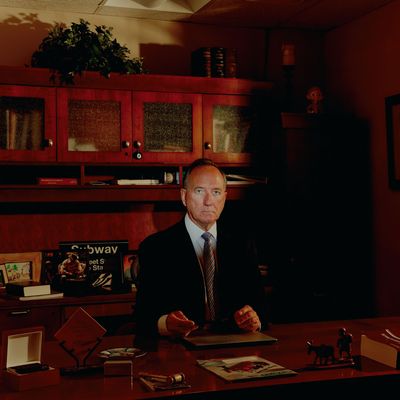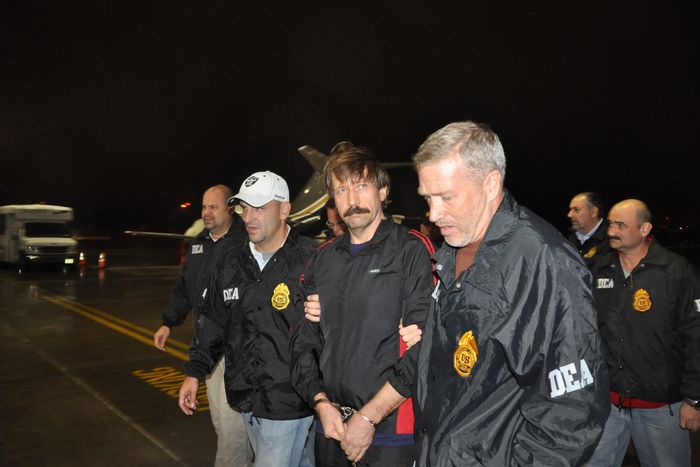
Update: On December 8, the U.S. and Russia completed a prisoner swap that freed arms dealer Viktor Bout from American prison in exchange for Griner’s release from a Russian penal colony.
The criminal defense attorney Steve Zissou works out of a plain building full of PIs and personal injury lawyers on the far east edge of Queens. One pleasant September afternoon, I walked into the office and passed a guy with a goatee and a smile. Zissou explained that he was a former client turned friend with an unusual background: “That young man used to be a member of Al Qaeda.”
This leads Zissou — tanned, relaxed, and attired nattily in a chambray blazer — into a call to arms for his profession, its belief in nuance and second chances. Even being in Al Qaeda is not “the end of the story,” Zissou says. Well — “for some it is. Particularly if they’re on the business end of a drone strike.”
Not long after that, Zissou shows me his artisanal Bill Murray coaster. The 2004 Murray movie The Life Aquatic With Steve Zissou is not inspired by this Steve Zissou, but to avoid any potential legal issues over the use of the singular name, this Steve Zissou was consulted and credited. “How many times have you seen the movie?” Zissou asks. “Did you see my credit?”
Zissou’s most pressing concern these days isn’t Al Qaeda or Bill Murray. It’s Viktor Bout, his most infamous client and the one he’s most urgently trying to recuperate in the public eye. Bout is a Russian national who is serving out the remainder of a 25-year sentence for multiple charges related to arms trafficking in federal prison. You might know him better as “the merchant of death.” The U.S. State Department has indicated that they’re willing to return Bout (pronounced Boot) to Russia in exchange for the Phoenix Mercury star Brittney Griner, who has been detained on cannabis charges there since February. Zissou believes he has helped pave the way for a deal, and he thinks he knows how it will go down.
As the WNBA entered its off-season this month, Griner’s many fans and supporters were left waiting for answers from Griner’s agent, from the league, from the White House — from anyone in a position of authority — about when she might be coming home. But if they really want to know what her future holds, they may be better off asking Zissou.
When news of her arrest was announced, Zissou immediately knew that the lives of his notorious client and Griner had become intertwined. That, he says, is when “everybody started paying attention.”
Viktor Bout was such a prominent mover of weapons in the ’90s that “officials in Washington began to see him as the quintessential figure of transnational crime.” That’s according to The New Yorker’s Nicholas Schmidle, who has reported extensively on him. Bout was an active arms dealer for less than a decade but harnessed a talent for aviation logistics to ship weapons to embargoed conflict zones all over the world, including countries like Afghanistan, Togo, and Rwanda — often helping to power bloody civil wars. He has been accused of having ties with the government of the Liberian warlord and former president Charles Taylor; he denies any direct link. For a brief period during the Iraq War, Bout was also supplying American troops with tents before the Pentagon noticed and ended the contracts. He managed to stay one step ahead of authorities for years and was never actually charged with arms trafficking during his most notorious period.
His downfall began 2008 when, per Schmidle, he was lured out of retirement by the U.S. government. In a conference room at the Sofitel hotel in Bangkok, he “told two undercover D.E.A. operatives posing as FARC members that he could supply them with seven to eight hundred Iglas, at a price of $120,000-$180,000 per missile.” Bout was then immediately arrested by Thai authorities and extradited to the U.S., where he was tried and convicted in Manhattan federal court.
A couple of years ago, Bout hired Zissou — a former Queens assistant DA turned veteran criminal defense attorney with experience in the federal system — to explore any possibilities left for his release. Since then, Zissou has become an impassioned advocate for Bout, making the case that his client is innocent everywhere from cable news to the inboxes of reporters covering Bout’s story while fielding some death threats along the way. Zissou describes his go-to line of argumentation as “You fucking idiot, here’s the truth.”
“No money was ever exchanged,” Zissou says. “No weapons were ever exchanged. He was retired, living in Moscow, and targeted specifically with a made-up crime simply so that he could be charged in the U.S. The U.S. is the only country that prosecutes cases like that. And they asked that Viktor be sentenced to life without parole.” Zissou slams on his desk: “Life without parole! For a talk crime!”
Zissou maintains that the pursuit of Bout by the DEA was a disastrous decision that has led directly to harsher treatment of Americans embroiled in legal trouble in Russia, including Brittney Griner. He notes that Bout, 55, could be out as early as 2027, which means his value in any potential swap is rapidly dwindling: “What are you holding on to him for!”
Most of all, what drives him nuts is the nickname. Zissou is a breathless monitor of Bout’s media presence, and he claims there’s only ever been one Bout article not to use the phrase “merchant of death.” (According to Schmidle, it was coined by a British Foreign Office official during an address in the House of Commons.)
It’s not only Bout’s lawyer who thinks his case was poorly handled. Shira Scheindlin, the judge who sentenced Bout, made clear that she gave him 25 years because it was the minimum she could per federal sentencing guidelines. (Scheindlin is best known for declaring New York’s stop-and-frisk law unconstitutional in 2013.) “It is virtually undisputed that until the DEA went after Bout, he had not committed a crime chargeable in an American court in all his years as an arms dealer,” she said at his sentencing. “But for the approach made through this determined sting operation, there is no reason to believe that Bout would ever have committed the charged crimes.”
Her opinion aside, Bout’s requests for a new trial were repeatedly rejected by the relevant appeals court. So Zissou’s best option — really his only option — was a State Department–facilitated prisoner swap in which Bout would be traded for an American the U.S. government had deemed wrongfully held in Russia. When Zissou first began working for Bout, there were only two people who fit that bill: Paul Whelan, detained on espionage charges in 2018, and Trevor Reed, detained on assault charges in 2019.
Zissou knew the State Department would never listen to Bout’s lawyer, but he thought they would listen to the Whelan and Reed families. So he made repeated attempts to establish a dialogue with the families and in turn to encourage them to lobby the State Department to trade their loved ones for Bout. It was slow going. Zissou believes the families felt that even discussing the release of Bout was distasteful.
Then, in February, just before Russia invaded Ukraine, Brittney Griner was arrested at an airport in Moscow for possession of 0.702 grams of hashish oil. And things got more interesting for Zissou and his client.
When she was first detained, Griner’s family followed standard State Department protocol and stayed quiet. But without any visible progress toward her release, Griner’s wife Cherelle took the lead on advocating for her at the White House. A few months later, in April, the Russians and the Americans did agree to a prisoner swap — Reed for a Russian national, Konstantin Yaroshenko, incarcerated in the U.S. on charges of cocaine trafficking. But Russia remained inflexible on Griner despite the growing outcry at her treatment in the United States and around the world.
Then, in July, there was a potential breakthrough. Secretary of State Anthony Blinken said publicly that the U.S. had made a “substantial proposal” to the Russian government for Griner. CNN later reported the offer was a trade of Bout for Griner and Paul Whelan. A few days later, Griner was sentenced to 9.5 years in a Russian penal colony — though the harsh sentence was expected and is possibly a procedural step ahead of a potential trade.
Zissou knows the No. 1 factor in a possible Bout deal is the motivation of the White House to free Griner, a high-profile celebrity. But he also believes that his peppering of both reporters covering Bout and the families of the wrongfully detained has changed the conversations that are happening in the press and privately between the State Department, the White House, and the families. Short of the State Department telling us, we can’t know how much credit he should get. But Zissou certainly believes that he’s softened opinion on Bout just enough to allow the State Department to entertain what was once a nonstarter: letting the infamous arms dealer go home.
Zissou says that after Blinken’s statement, he believes the U.S. and Russia are “on the precipice of a swap. And the way you can tell that is about to happen is that everyone is radio silent.”
In his view, a deal wouldn’t take place until after the midterms, since the White House doesn’t want to appear soft on Russia. The remaining issue, Zissou says, is “the numbers.” The Americans are kidding themselves if they think they’ll get both Griner and Whelan back for Bout, he says. He throws out one possible candidate to even things out: Roman Seleznev, a Russian national who was arrested in the Maldives on charges related to hacking before being bundled into the U.S. by the Secret Service and who is now incarcerated in North Carolina.
Whatever shape an agreement takes, Zissou doesn’t think it will come with advanced notice. When Bout is freed, he says, “they’ll just get him up in the morning.” Zissou will be alerted in order to sign off on Bout’s release from the Bureau of Prisons, after which he believes Bout will be taken to a Turkish air base. (Reed and Yaroshenko were also swapped in Turkey.)
On September 16, President Biden met with Cherelle Griner and Paul Whelan’s sister Elizabeth at the White House but did not say anything about a possible swap. For now, everyone continues to wait for the day Bout might leave Illinois and Griner might come home.
“I speak to Viktor every other week with legal calls,” Zissou says. “When we finally got to the point where this strategy to correct the narrative came to fruition, where the U.S. government is willing to swap him, now I’m like, What do I do?” On a recent phone call with his client, Zissou spun his wheels. He asked Bout, “‘Should we try this, should I reach out to–’”
As Zissou recalls it, Bout cut him off and said of the deal that would exchange him for Griner: “Steve, when I was in the army we called it long patience. You gotta be patient. It’s gonna happen.”






























